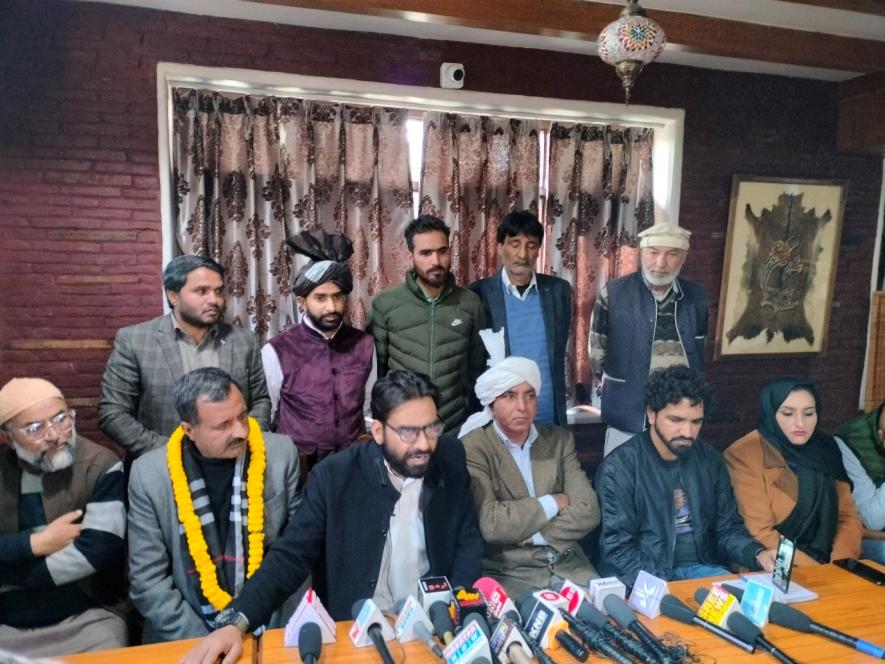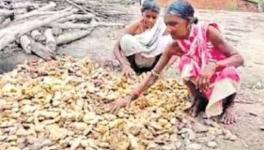Gujjar-Bakerwal Groups to March Against ‘Dilution’ of ST Status

Members of the Gujjar and Bakerwal joint action committee address the media in Srinagar on Friday.
Srinagar: Members of the Gujjar and Bakerwal communities formed a joint action committee (JAC) on Friday to march from North Kashmir’s Baramulla to Jammu’s Kathua district on November 4 against the “dilution” of the Schedule Tribe (ST) status in the region.
The JAC—which includes members of several groups, including Gujjar-Bakerwal Conference Jammu Kashmir, Gujjar-Bakerwal Youth Welfare Conference, All Tribal Coordination Committee, International Gujjar Mahasabha and Gujjar-Bakerwal Student Union and elected representatives and activists—put forth three demands.
The JAC also rejected the report of the J&K Commission on Socially and Educationally Backward Classes, headed by retired Justice GD Sharma, which has recommended reservation for the Pahari-speaking people of the Union Territory (UT).
It demanded the reconstitution of the Commission claiming that it lacks members from ST, Scheduled Caste and Other Backward Classes and argued that “upper-caste Muslims and Hindus cannot do justice with marginalised sections of society”. The JAC also sought proper implementation of the Forest Rights Act, 2006.
JAC spokesperson Talib Hussain, a tribal activist and youth president of the Peoples Democratic Party’s (PDP) tribal wing, said that the march is expected to raise awareness among tribal communities in far-flung areas against the “dilution” of ST status.
“The recent report of Justice GD Sharma Commission made a mockery of the social justice by including those groups and communities in the proposed Schedule Tribe list who have been rulers in past and are economically as well as socially better off,” Hussain said during a presser in Srinagar.
The Gujjar-Bakerwal community, believed to be the third largest ethnic community in J&K after Kashmiris and Dogras, has 15 lakh members, according to the 2011 Census. The nomadic communities were notified as ST in the erstwhile state of J&K in 1991 after decades of struggle.
The communities have been protesting since Union home minister Amit Shah announced reservation for Paharis at a public rally in Rajouri earlier this month.
The Gujjars and Bakerwals believe that the Paharis have higher social status and also control the economic activities in the region. “They are neither backward nor poor and have no trait to be notified as a tribe. A group of religions with a complex caste structure cannot be designated as a tribe,” the JAC said in a statement.
Hussain also questioned the government’s “intentions” to call a heterogeneous group of communities an ethnic group, especially the Paharis, who, the tribal activist said, are culturally, religiously and linguistically a “diverse group”.
“How can a Syed be ethnically the same as a Brahmin? Syeds claim that they came here from Saudi Arabia. Therefore, they cannot be the same as tribals, who live in Pir Panjal and Baramulla or Kupwara,” Hussain added.
The committee also alleged that the Bhartiya Janata Party (BJP) government is “politicising the issue of reservation for the sake of votes”. “We are fighting to save the Constitution, which has empowered marginalised sections, like Dalits and tribals. We will reach out to the tribals of the country to support our movement. It’s not just a local but national issue and the addition of upper castes to the ST category will impact all the tribal communities at the national level,” Hussain said.
Pertinently, the J&K administration included as many as 15 new categories to the list of social castes in the UT, which, the authorities said, will help marginalised communities in getting education and jobs. Some of them, however, have protested the decision stating that they deserve a better placement.
Get the latest reports & analysis with people's perspective on Protests, movements & deep analytical videos, discussions of the current affairs in your Telegram app. Subscribe to NewsClick's Telegram channel & get Real-Time updates on stories, as they get published on our website.























